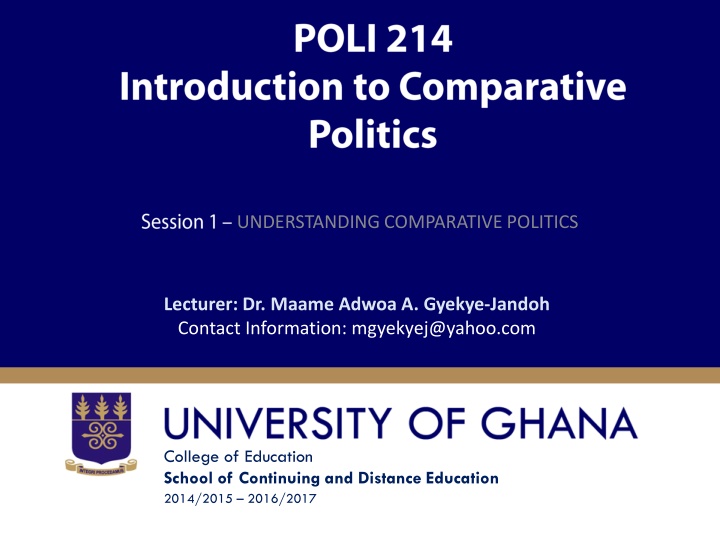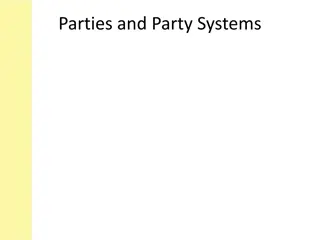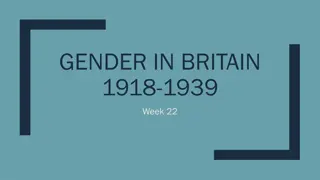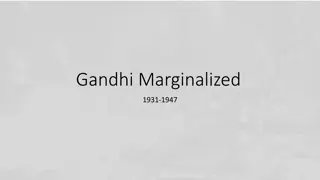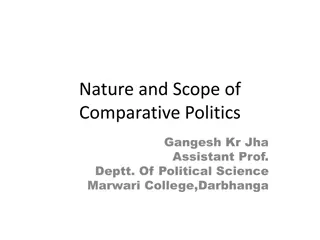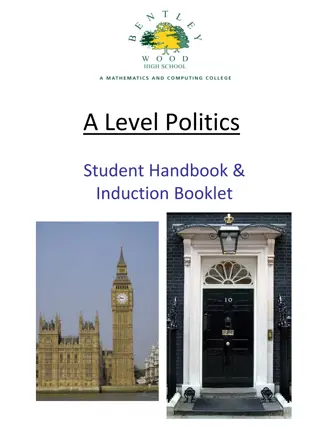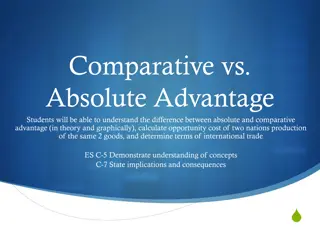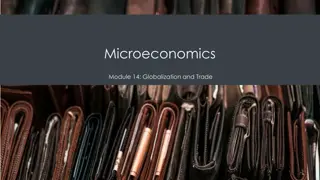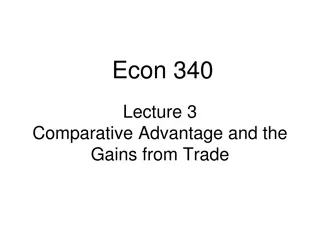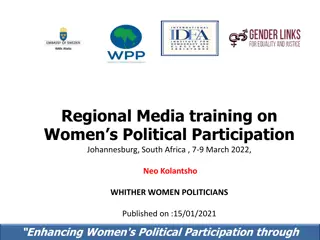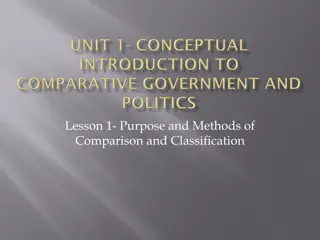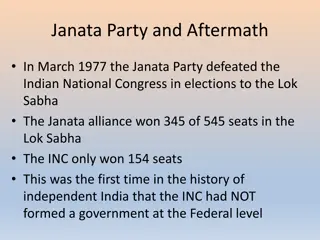Introduction to Comparative Politics
This introductory session delves into the field of Comparative Politics, exploring the definition, importance, and methods involved. Topics covered include the Comparative Method, debates in Comparative Politics, and fundamental questions in the field. Get insights into political systems, institutions, and global comparisons in this engaging session.
Download Presentation

Please find below an Image/Link to download the presentation.
The content on the website is provided AS IS for your information and personal use only. It may not be sold, licensed, or shared on other websites without obtaining consent from the author.If you encounter any issues during the download, it is possible that the publisher has removed the file from their server.
You are allowed to download the files provided on this website for personal or commercial use, subject to the condition that they are used lawfully. All files are the property of their respective owners.
The content on the website is provided AS IS for your information and personal use only. It may not be sold, licensed, or shared on other websites without obtaining consent from the author.
E N D
Presentation Transcript
UNDERSTANDING COMPARATIVE POLITICS Lecturer: Dr. Maame Adwoa A. Gyekye-Jandoh Contact Information: mgyekyej@yahoo.com College of Education School of Continuing and Distance Education 2014/2015 2016/2017
Session Overview Overview This introductory session is very important because it provides the foundation for the study of the other sessions. In this session, you will become familiar with the field of Comparative Politics: what politics is and what Comparative Politics is all about, and with a few reasons why it is important to study Comparative Politics. An understanding of what Comparative Politics is about will serve as a guide for understanding the remaining sessions in this course. The Comparative Method by which most comparativists study political phenomena will also be introduced, as well as the debates in Comparative Politics, in order that you can study politics and political systems in a systematic and comparative manner. Slide 2
Session Outline The key topics to be covered in the session are as follows: Topic One: What is Comparative Politics? Topic Two: The Comparative Method Topic Three: Debates in Comparative Politics Topic Four: Conclusion Slide 3
Reading List O Neil, Patrick H. (2007) Essentials of Comparative Politics. New York; London: Norton. 2nd edition. Read chapter 1. O Neil Patrick H., Field, Karl, and Don Share (2006). Cases in Comparative Politics. New York; London: Norton. 2nd edition. Read chapter 1. Slide 4
Topic One WHAT IS COMPARATIVE POLITICS? Slide 5
Comparative Politics Defined To come by a clear definition of Comparative Politics, we must first define what politics itself is all about. Politics is the struggle in any group for power that will give a person or people the ability to make decisions for the larger group. It is essentially the struggle for the authority to make decisions that will affect the people as a whole. Comparative Politics is therefore a subfield of politics that compares this struggle across countries. By studying a wide variety of countries, comparativists hope to shed light on the countries under study as well as on one s own political system. Slide 6
Fundamental Questions in Comparative Politics There are five fundamental questions in Comparative Politics that comparativists consider as they go about their work. First: how can political systems be compared? Second: what are the limitations of the comparative method? Third: how do institutions shape politics in various countries? Fourth: how do different countries reconcile freedom with equality? Fifth: can a political system achieve high levels of both freedom and equality? Slide 7
Sample Questions In your own words, briefly explain what you understand by Comparative Politics. Briefly state at least three of the fundamental questions in Comparative Politics. Give two reasons why it is important to study Comparative Politics. Slide 8
Why Study Comparative Politics? 1. It is necessary to study Comparative Politics because the outside world cannot be ignored; we ignore it at our own peril. There is a need to master the internal complexities of other countries and investigate patterns of politics around the world, so that we can find out for ourselves the way in which countries operate internally, and how they may affect us. 2. We must study Comparative Politics because by understanding politics in a comparative setting, we arm ourselves with the knowledge that is necessary for making informed decisions about our own lives. 3. In Comparative Politics, political choices are based not on abstract ideas, but on very real examples and alternatives. Thus, comparative politics has very practical and important applications. Slide 9
Topic Two THE COMPARATIVE METHOD Slide 10
What is the Comparative Method in Comparative Politics? The Comparative Method is a means of making comparison across cases. It seeks to draw generalizations about politics that could be valid in other cases. The Comparative Method is comprised of certain key elements or characteristics this means that most comparativists, in using the Comparative Method, seek to achieve or be able to boast of most of these key elements. 1. Researchers using the Comparative Method seek to generalize about political phenomena from the study of some political systems or countries that may have certain things in common with other political systems or countries (common histories, socioeconomic status, cultures, etc), so that they can generalize and assert that their findings will also be valid or will also hold in these other cases. Slide 11
What is the Comparative Method in Comparative Politics? 2. Researchers also seek to be able to establish causality or at least correlation between two or more variables. When they are able to establish causality, their chances of generalizing about and predicting political phenomena are increased. Correlation, however, is not causality; it just establishes that there is a strong relationship between two or more variables. Causality, on the other hand, is when a change in one variable causes change in another. For example, a researcher could decide to look at how economic prosperity or the lack of it can affect political stability. In this case, economic prosperity is the independent variable, while political stability is the dependent variable. Causality is established when a change in economic prosperity (maybe for the worse) causes a change in political stability (weakens it or brings instability). Slide 12
The Comparative Method (contd.) 3. The Comparative Method seeks to explain political phenomena for example, why some countries are democratic and others are not; why some countries are developed and others underdeveloped; why elections were successful in one country and unsuccessful in another country that has similar cultures, language, history. 4. Another element of the Comparative Method is prediction. Comparativists seek to be able to predict phenomena about politics or political systems in different parts of the world. 5. Finally, it is very important that whatever is studied and compared can be verified, and therefore the issue of Verifiability is very important. Other researchers must be able to follow through one s methods and verify the methods by which the findings were arrived at. In a nutshell, there are five elements of the Comparative Method that all comparativists set out to achieve when engaging in research. Generalization and prediction are the two elements that are, however, difficult to achieve consistently since they depend to a large extent on the establishment of causality. Slide 13
The Quantitative and Qualitative Research Methods in Comparative Politics The quantitative research method relies on statistical data from a range of countries to construct hypotheses about politics. Researchers are able to draw from a large number of cases and control their variables more easily, but they are limited by those variables that can be expressed in quantitative terms and exist across a number of cases. The emphasis of the quantitative research method is on breadth over depth, that is, the ability to gather data on a large number of cases or countries rather than on garnering in-depth information on a few cases or countries. Slide 14
The Quantitative and Qualitative Research Methods in Comparative Politics The qualitative research method, on the other hand, stresses that one cannot truly understand a country or region unless one is steeped in its history and culture. This research method tends to focus much more on the unique aspects of countries; there is an emphasis on depth over breadth of cases or countries. Qualitative methods create an in-depth knowledge of a country or countries, while quantitative methods can provide broader analysis across regions and time. Slide 15
Limitations of the Comparative Method 1. Causality. Finding the cause or causality is rarely easy because political scientists are unable to control the variables in the cases they study, because these are cases involving real countries and people. 2. Comparative political scientists are unable to make true comparisons, since each case is quite different. At best, they might categorize countries on the basis of specific factors, and control as much as possible for variables that might otherwise distort their conclusions. For example, if we want to understand why gun-possession laws are so much less restrictive in the US than in most other advanced countries, we could compare US laws to laws in other countries that have similar historical, economic, political, and social experiences, like Canada and Australia (O Neil 2007). Slide 16
Limitations of the Comparative Method (contd.) 3. Comparative political scientists are often hampered or restricted by a limited number of cases, because the number of countries in the world is less than 200. In addition, the number of cases is also limited by time in other words, depending on whether one wants to study and compare countries that are democratic, for example, one may be limited to only a few cases/countries in the world that are without a doubt democratic (O Neil 2007). 4. Comparativists, in employing the Comparative Method, are limited in how they access the cases that are available to be studied. Few comparativists have the language skills, time or resources to conduct field research in a number of countries. They thus often master knowledge of a single country instead, which limits the comparisons they can make. Sometimes, they also compare different times and events/periods within the same country regarding some particular phenomenon of politics (O Neil 2007). This is called time series analysis. For example, a researcher could take Ghana as a case but have several cases to compare because he chooses to study the policies of different presidents in the different political administrations since independence in 1957 (the Nkrumah period versus the Akufo-Addo, Acheampong, Rawlings periods, for example). Slide 17
Questions What is one key difference between the quantitative research method and the qualitative research method? Briefly explain two limitations of the Comparative Method. Briefly describe the Comparative Method to a friend. Which elements of the Comparative Method are difficult to come by, and why? Slide 18
Topic Three DEBATES IN COMPARATIVE POLITICS Slide 19
Major Contributions of Philosophers to the field of Comparative Politics 1. Aristotle (384-322 BC): In his seminal work, the Politics, Aristotle gathered and analyzed the constitutions of 158 Greek city-states, and argued for an empirical (observable and verifiable) science of politics with a practical purpose how to govern/statecraft. Aristotle was the first to separate the study of politics from philosophy. 2. Niccolo Machiavelli (1469-1527): In his major work, The Prince, Machaivelli, in his pragmatic or realistic fashion, highlighted the mechanics of government, diplomacy, military strategy, and power. Like Aristotle, he emphasized statecraft (how to govern) and empirical knowledge. He also analyzed different political systems, believing that the findings could be applied by statesmen. Slide 20
Major Contributions of Philosophers to the field of Comparative Politics 3. Thomas Hobbes (1588-1679): In his Leviathan, Hobbes advocated particular political systems based on empirical observation and analysis. He developed the notion of a social contract, where people surrender certain liberties in favour of order. Hobbes argued for a powerful state. 4. John Locke (1632-1704): Locke argued in his Two Treatises of Government that private property is essential to individual freedom and prosperity. In contrast to Hobbes, Locke advocated a weak state that would not be able to encroach upon the rights and freedoms of its citizens. 5. Charles Louis de Secondat, Baron de Montesquieu (1689- 1755): In The Spirit of the Laws, Montesquieu studied the practical government systems, and explained and argued for the separation of powers within government. Slide 21
Major Contributions of Philosophers to the field of Comparative Politics 6. Jean-Jacques Rousseau (1712-1778): In The Social ContractRousseau argued that citizens rights are inalienable and cannot be taken away by the state. His work influenced the development of civil rights. 7. Karl Marx (1818-1883): Marx developed a theory of economic development and inequality in his Das Kapital, and predicted the eventual collapse of capitalism and democracy. 8. Max Weber (1864-1920): Weber wrote Economy and Society, in which he elaborated on the concept of bureaucracy, forms of authority, and the impact that culture has on economic and political development (O Neil 2007). Slide 22
Modernization Theorys Influence Comparative Politics was also influenced in the 1950s by Modernization theory, which argued that as societies developed, they would become capitalist democracies, and would hold in common a shared set of values and characteristics. These values included achievement-orientation as promotion policy in society; rational scientific approach to tackling problems; and a promotion of individual freedoms and capitalist entrepreneurial spirit. Note, however, that these theoretical assertions have not been fully proven yet in reality. Question: What, in your view, are the two most important contributions by philosophers to the study of Comparative Politics, and why? Slide 23
Trends in Comparative Politics Different approaches have been dominant in Comparative Politics at different times. There are three main approaches you will be introduced to here: 1. The traditional approach, dominant in the 19th to early 20th centuries, emphasized the description of political systems and their various institutions. 2. The behavioural approach or revolution of the 1950s and 1960s marked a shift from a descriptive study of politics to one emphasizing causality, explanation, and prediction. The behavioural revolution placed greater emphasis on the political behaviour of individuals as opposed to larger political structures or institutions, and on the quantitative research method rather than the qualitative research method. Modernization theory was predominant in this approach, and it was thought that eventually, a grand theory of political behaviour would be arrived at that would be valid across countries (O Neil 2007). Slide 24
Trends in Comparative Politics 3. Finally, the post-behavioural approach of the 1970s and onwards rejected a grand theory of politics, and criticized modernization theory as biased and inaccurate. This approach rather emphasized a diversity of political approaches depending on what the research was about, and emphasized the importance of research on issues of gender, culture, the environment, and globalization, for example. The post-behavioural approach has been quite dominant since the 1980s. Question: State briefly the difference between the traditional approach and the behavioural approach to the study of Comparative Politics. Slide 25
Topic Four CONCLUSION OF SESSION ONE Slide 26
Conclusion of Session One In this session, you have been introduced to the concept of Comparative Politics, as well as why it is important that everyone study some aspect of it. In addition, you have learned about the Comparative Method, and the quantitative and qualitative research methods, which are different ways of approaching research using the Comparative Method. The significant contributions of philosophers to the study and method of Comparative Politics have been highlighted, as well as some of the main approaches to the study of Comparative Politics. You have learned that different approaches have been more dominant at different times since the 19th century. In the next session, we shall take a look at some of the new global developments that shocked most Comparativists beginning in the 1980s, Political Institutions as a Guiding Approach to the study of Comparative Politics, and Reconciling Freedom and Equality: A Guiding Idea. Slide 27
References O Neil, Patrick H. (2007) Essentials of Comparative Politics. New York; London: Norton. 2nd edition. O Neil Patrick H., Field, Karl, and Don Share (2006). Cases in Comparative Politics. New York; London: Norton. 2nd edition. Slide 28
